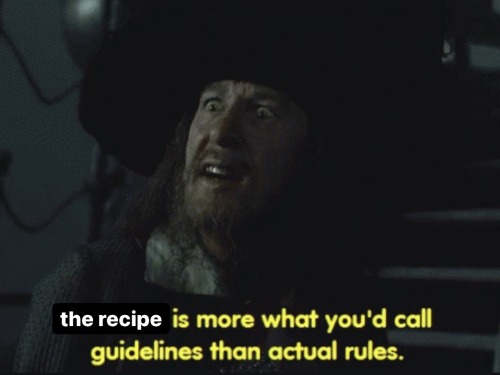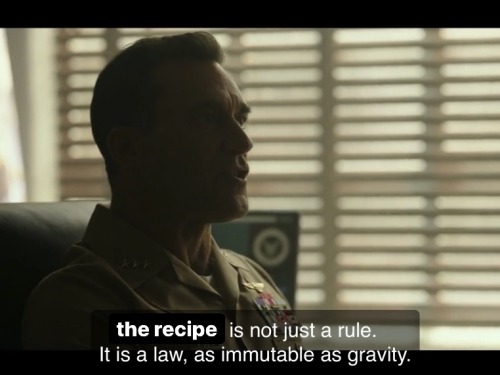It Should Go Without Saying. And Yet, It Must Be Said.
It should go without saying. And yet, it must be said.

It slaps.
More Posts from Unkajosh and Others
This is really obvious, and yet...




Game Design and Variable Costs
This is intended to be a short essay looking at something that’s an issue in game design, specifically character creation in games. More specifically, how allocating resources during character creation can be a tricky process, and a trickier one when there are multiple resource pools that can be used for similar things, or where one kind of resource can be converted into others.
What ‘resource pools’ are isn’t always obvious. Games such as the Hero System are straightforward in this regard-- a character built with a pool of points that are spent to acquire all of the capabilities of that character, their attributes, skills, equipment, whatever other resources they have available. But other systems that allow choices to be made in character creation are, in effect, creating ‘resource pools’ of a different kind, some obvious, some less so.
For one example, the Storyteller System has characters decide how to allocate different pools of ‘dots’ to a wide range of characteristics-- and make decisions on which group of sub-characteristics receives more dots to allocate, so a character will decide to put a larger pool of dots into mental, physical or social attributes, and then spend those dots within each of those categories, and make similar choices for different categories of skills, and for a wide range of other resource types; GURPS characters, in turn, are built almost entirely of one pool of points, except that their equipment is purchased with money, instead-- and they can convert character points into money to have more to spend on equipment. Many game systems will have pools of points for different categories in a simpler approach-- so many points for attributes, so many for skills, so many for equipment.
But other costs still exist even in systems that don’t directly provide pools of points to be spread around! In Dungeons and Dragons 5e, aside from using one of several systems for allocating attributes, a very granular resource is spent on choosing an ancestry, another on a class, and later, another on a subclass. Should we view these in the same way? I think we should; this is especially important when designing ancestries, classes and subclasses, if we want to have any pretense of balance among different types of characters. (This is why I wrote extensive essays elsewhere on subclasses in D&D; class/subclass features *are a resource pool* and extremely vulnerable to balance issues.) In much the same way, a FATE character has a limited pool of Stunts and Aspects, and careful decisions should be made about how to spend them to create a character that can do what is desired.
But a pitfall of system design, and the heart of this essay, is about the difficulty of having different resource pools that can be used for similar results, either by being transformed into each other, or by being used for the same purpose. More specifically, I’m identifying pitfalls that I and others have seen in character design in some games. (I’m sorry that I will be calling out a number of specific games, including, no doubt, some that any readers I somehow get will love dearly, for what I see as weaknesses in game design, but I’m not trying to hurt anything or anyone-- just point out things that could perhaps be avoided or handled better.)
One area that this can happen is converting resource pools to other purposes. For example, in GURPS, character points can be used to buy such things as natural weapons or even superpowers-- but they can also be spent to buy such things as the Wealth advantage, which allows the character to then spend an expanded pool of money on a wide range of things, some of which *will duplicate the effects of powers.* For an easy example of this, we’ll look at GURPS Powers 4e; we see here, using an example the gamebook thoughtfully provides, that we can create a pistol that duplicates the characteristics of a TL7 Auto Pistol for 22 points… but said pistol in the character book costs $350, which is a tiny fraction of the basic money pool of a TL7 character. Yes, it’s not the same thing-- buying it as a power implies that it’s innate and cannot be removed-- but spending 22 points out of the 100-250 character points a common GURPS character might have to start with for something that they could spend 0 points for is a bit extreme; it gets more so if the characters are in a game where being unable to use their weapons in a situation where they would want to (because of theft or local laws, for example) simply doesn’t come up at all, and such games are not at all uncommon.
The original Storyteller System had a different, if related issue-- during character creation, purchasing various characteristics of almost any kind had a linear cost, but spending experience points, later, had a cost that scaled up with the current value of that characteristic sharply, while purchasing a low level of a new characteristic was much cheaper, thus letting characters who purchased high levels of a few characteristics during creation but rounding themselves out with experience later having higher and more numerous characteristics than ones who instead made broadly-based characters with low levels in a wide range of abilities, and then tried to raise them later with experience. Luckily, the later versions of the Storyteller system have been moving away from this problem, but it’s a pitfall to avoid when resources can be converted into each other, especially if character advancement *changes* how various abilities are purchased.
(In this essay, I won’t be touching on another, related issue-- point-buy systems that simply give better results per point to specific purchases. That’s highly system-specific, but always an issue to watch out for! For examples, see any discussion of how to make an efficient Hero system character.)
I think, though, where I see this issue come up most commonly is in situations where highly-granular abilities can be used for the same purpose as other abilities purchased with other resource pools. The (probably obscure) Chronicles of the Void had this issue for some characters-- a Human Varigator or Aqasoo Nova might spend one of their precious few class abilities on the ability to make ranged psionic attacks via energy manipulation or telekinesis. But that Lauxnaut Sharpshooter is instead using a gun they got as starting equipment to do comparable damage, and is using their class ability to ignore the cover of their designated target! In much the same way, I often see, for example, third-party D&D subclasses that let characters make unarmed attacks and have unarmored defenses comparable to those of characters who fight with weapons, and that sounds good until you realize that other subclasses can have the same AC, dish out just as much damage, but *still have all of their class features available for other things.* Similarly, some class features let a character create equipment that’s just as good as regular equipment, and that’s just not much of a feature at all.
This is sometimes encountered more broadly, as well-- “Defeating enemies” is a desired result in many games. Different resource pools, via powers, equipment, spells, class features, ancestry features, or anything else might contribute to this result; they may do so by inflicting damage, hindering enemies, or outright knocking them out of the fight without engaging with other subsystems, and unfortunately, sometimes, different choices made-- different prices paid-- produce dramatically different results. I’ve seen it in theory, but I’ve also seen it in actual play, time and time again.
And I think game designers need to look carefully at their systems to ensure that this doesn’t sink their designs.
But Josh, why are you so worried about game balance? Does it really matter? Well, yes, I think it does. It can be frustrating for a player to realize that the choices that they made for whatever reason have rendered their character irrelevant in a situation. People don’t like, as a general rule, feeling helpless. Furthermore, it makes creating a balance for an enjoyable game harder when the GM has to adjust challenges for a group of players with highly disparate abilities, and if the GM attempts to balance things by creating THIS challenge for THAT character, but THIS GREATER challenge for THAT OTHER character, a simple change in positioning, for example, can destroy the illusion of everyone contributing in an instant.
Okay, but Josh, about that powers vs gear thing-- isn’t it really important that a character can get that result without relying on equipment that can be broken or taken away? Hey, I’ll grant that this can be very different in different games. In an intrigue game, say, or an espionage one, the ability to be apparently unarmed but still able to strike down enemies might be a game-changer! But in my own experience, this is a *very* rare circumstance-- and it’s one that is often not even considered in game design in other ways. As a quick example, let’s look at D&D again. A given warlock can fire an Eldritch Blast for damage that is (very) roughly equivalent to what a skilled archer can inflict; this is broadly considered to be balanced, and if we compare warlocks with Hex to rangers with Hunter’s Mark, we see that, for better or worse, the designers had those in mind as (again very roughly) balanced choices. But the warlock doesn’t need a weapon at all-- they’re casting a spell, one that doesn’t even have a material component, while that ranger not only needs a weapon, they need a really big one like a longbow or heavy crossbow to match the warlock’s damage! But nobody really worries about that part of it, do they? Discussions of class balance cover things like access to high-level spells, attacks per round, damage per round, and so on. Characters being denied their gear is simply not a factor in most modern games; it’s just not an issue for most characters.
What does all of this mean? Well, it’s something to work on when a game designer creates something. Look at what the different costs actually are; decide if the balance issues are a serious problem. And think about how it all comes together. And playtest. Possibly a lot.
This is so 100% true that my jaw hit the floor.

Attn: police
Hey, why not?
Reblog this if it’s okay to DM you and shoot the friendship shot.
YES GOOD LORD
Don't care much for Biden? Right there with you. Will I take him over Trump? EVERY GOD-DAMNED TIME.
Would I rather have someone else? Obviously! BUT THAT IS NOT THE WORLD WE LIVE IN.
Btw you can be intensely critical of the Democratic party and recognize that it is full of aged out of touch moderates who are refusing to meet the urgency of the moment,
and also recognize that voting for Democrats is extremely important because it allows things like the confirmation of Justices and prevents the literal fascist party from gaining more power and that harm reduction is an important end in itself
These things can coexist
Politics is a long game. Being disappointed and angry today does not obviate your responsibility to participate
This is 100% true.
cooking baking


I look at the world, and I say, "Why don't we try this? We can't really make things worse, can we? And this would be justice. This would be justice."
happy PRIDE i’m here i’m queer and i believe the land should be given back to the proper indigenous stewards.
Seriously. Why do we idolize people who suck the money up from the poor?

100% true. Overcoming what holds you back should be celebrated.

Liz Fosslien
Hey, her girlfriend/wife got kidnapped! Of course she's upset!






Dorothy straight-up NOT having a good time during The Lost Princess of Oz,.
Bonus:

-
 adsheffey reblogged this · 1 month ago
adsheffey reblogged this · 1 month ago -
 glitterbuggalaxy reblogged this · 1 month ago
glitterbuggalaxy reblogged this · 1 month ago -
 valleynausicaa reblogged this · 1 month ago
valleynausicaa reblogged this · 1 month ago -
 smokeysayshelp liked this · 1 month ago
smokeysayshelp liked this · 1 month ago -
 givemeafuckingbreakorurgay liked this · 1 month ago
givemeafuckingbreakorurgay liked this · 1 month ago -
 fluffyblackdragon reblogged this · 1 month ago
fluffyblackdragon reblogged this · 1 month ago -
 fluffyblackdragon liked this · 1 month ago
fluffyblackdragon liked this · 1 month ago -
 nowjumpinthewater reblogged this · 1 month ago
nowjumpinthewater reblogged this · 1 month ago -
 jerry-the-leech reblogged this · 1 month ago
jerry-the-leech reblogged this · 1 month ago -
 jerry-the-leech liked this · 1 month ago
jerry-the-leech liked this · 1 month ago -
 mythixsolar liked this · 1 month ago
mythixsolar liked this · 1 month ago -
 ghostermctoaster liked this · 1 month ago
ghostermctoaster liked this · 1 month ago -
 greenhedgie reblogged this · 1 month ago
greenhedgie reblogged this · 1 month ago -
 butheresthetransitioner liked this · 1 month ago
butheresthetransitioner liked this · 1 month ago -
 lonelyescapes liked this · 1 month ago
lonelyescapes liked this · 1 month ago -
 heisthours reblogged this · 1 month ago
heisthours reblogged this · 1 month ago -
 heisthours liked this · 1 month ago
heisthours liked this · 1 month ago -
 alriiiiiight liked this · 1 month ago
alriiiiiight liked this · 1 month ago -
 bloodybrilliant-mnk liked this · 1 month ago
bloodybrilliant-mnk liked this · 1 month ago -
 funky-lill-communist liked this · 1 month ago
funky-lill-communist liked this · 1 month ago -
 currentlymakingbeans liked this · 1 month ago
currentlymakingbeans liked this · 1 month ago -
 begformebleeding liked this · 1 month ago
begformebleeding liked this · 1 month ago -
 notlily2 liked this · 1 month ago
notlily2 liked this · 1 month ago -
 neda-koleva liked this · 1 month ago
neda-koleva liked this · 1 month ago -
 issabelladonna liked this · 1 month ago
issabelladonna liked this · 1 month ago -
 wing-sofa-sparrow liked this · 1 month ago
wing-sofa-sparrow liked this · 1 month ago -
 umbra-regina liked this · 1 month ago
umbra-regina liked this · 1 month ago -
 tianablackwell3000 liked this · 1 month ago
tianablackwell3000 liked this · 1 month ago -
 mimida21 liked this · 1 month ago
mimida21 liked this · 1 month ago -
 wellexcuuuuuseme liked this · 1 month ago
wellexcuuuuuseme liked this · 1 month ago -
 clstoll liked this · 1 month ago
clstoll liked this · 1 month ago -
 ktowngayboy reblogged this · 1 month ago
ktowngayboy reblogged this · 1 month ago -
 mrsplashes liked this · 1 month ago
mrsplashes liked this · 1 month ago -
 punkrockinchairs liked this · 1 month ago
punkrockinchairs liked this · 1 month ago -
 unuson reblogged this · 1 month ago
unuson reblogged this · 1 month ago -
 unuson liked this · 1 month ago
unuson liked this · 1 month ago -
 ballpitbaptism liked this · 1 month ago
ballpitbaptism liked this · 1 month ago -
 crsycrat reblogged this · 1 month ago
crsycrat reblogged this · 1 month ago -
 potatlepaladin reblogged this · 1 month ago
potatlepaladin reblogged this · 1 month ago -
 potatlepaladin liked this · 1 month ago
potatlepaladin liked this · 1 month ago -
 hellreek liked this · 1 month ago
hellreek liked this · 1 month ago -
 flaetsbnort liked this · 1 month ago
flaetsbnort liked this · 1 month ago -
 un-recall liked this · 1 month ago
un-recall liked this · 1 month ago -
 mythically-fun-creature reblogged this · 1 month ago
mythically-fun-creature reblogged this · 1 month ago -
 clock-of-the-leaf liked this · 1 month ago
clock-of-the-leaf liked this · 1 month ago -
 sanguineousinkblot reblogged this · 1 month ago
sanguineousinkblot reblogged this · 1 month ago -
 sanguineousinkblot liked this · 1 month ago
sanguineousinkblot liked this · 1 month ago
